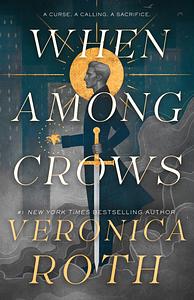You need to sign in or sign up before continuing.
Take a photo of a barcode or cover
dark
mysterious
tense
fast-paced
Plot or Character Driven:
Character
Strong character development:
Yes
Flaws of characters a main focus:
Yes
adventurous
emotional
hopeful
inspiring
mysterious
sad
tense
fast-paced
Plot or Character Driven:
A mix
Strong character development:
Yes
Loveable characters:
Yes
Diverse cast of characters:
Yes
Flaws of characters a main focus:
Yes
adventurous
challenging
dark
mysterious
medium-paced
Plot or Character Driven:
A mix
Strong character development:
Yes
Loveable characters:
Complicated
Diverse cast of characters:
Yes
Flaws of characters a main focus:
Yes
fast-paced
Plot or Character Driven:
A mix
Strong character development:
Yes
Loveable characters:
Yes
Diverse cast of characters:
Yes
I loved Carve the Mark set and of course the Divergent series. This felt like a novella. It has the potential for something great, but felt like a teaser.
I like the polish angle and feeling a little crusades. I’m not sure what the author was going for with this book.
I like the polish angle and feeling a little crusades. I’m not sure what the author was going for with this book.
adventurous
emotional
lighthearted
mysterious
tense
fast-paced
Plot or Character Driven:
A mix
Strong character development:
Yes
Loveable characters:
Yes
Diverse cast of characters:
Yes
Flaws of characters a main focus:
Yes
adventurous
challenging
dark
emotional
funny
mysterious
tense
fast-paced
Plot or Character Driven:
A mix
Strong character development:
Yes
Loveable characters:
Yes
Diverse cast of characters:
Yes
Flaws of characters a main focus:
Yes
"How did you carry it without being able to bear it?"
This question lingered in my mind long after closing the final page of When Among Crows. Not because it was new, but because Roth understands how to make an old ache feel raw again. We all carry things — guilt, grief, generational scars — and Roth’s novella reminds us that the weight doesn’t lessen just because no one else can see it.
What It's About (And Why It’s More Than That)
At first glance, this is a sharp little urban fantasy novella set in modern-day Chicago, blending Polish folklore with the gritty edges of city life. But beneath the layers of strzyga, zmory, leshy, and rusalki, this story isn’t really about curses or magic. It’s about the inheritance of pain — how trauma echoes through bloodlines, communities, and even continents.
Dymitr’s quest to lift Ala’s curse feels like a fairy tale on the surface, but Roth complicates it. Magic in this world doesn’t heal without taking something first. Everything costs something. Whether it’s a piece of your body, a piece of your soul, or years of your life spent burdened by what someone else did before you were born.
“When among crows, you must caw as one.”
This proverb, laced throughout the story, becomes more than folklore. It’s a survival tactic. It’s assimilation. It’s the forced kinship of the outcast and the haunted. It asks: How much of yourself do you have to give away just to live among others?
What I Loved (And Why It Stuck With Me)
Roth’s strength has always been in her worldbuilding through implication rather than exposition. She trusts her reader to meet her halfway. Here, Chicago’s backstreets pulse with magic that feels both ancient and forgotten. A movie theater run by fear-feeding creatures. A Holy Order that hides its monstrousness beneath righteousness. Baba Jaga lurking like a spider in the middle of her web. These elements breathe because Roth doesn’t over-explain them; she lets them haunt the margins, which somehow makes them feel more real.
But it’s the humanity of these characters that gripped me most. Dymitr, Ala, Niko — they are each balancing acts between worlds, between duty and desire, between the stories they’ve been told and the ones they want to write for themselves.
Ala’s curse, in particular, struck me as a metaphor for generational trauma. It isolates her. It reshapes how others see her. It distorts her understanding of herself. Yet it’s through connection — through imperfect, painful, stubborn human (or not-quite-human) bonds — that healing begins.
The Personal Thread
I come from a family of immigrants. Not Polish, but close enough in experience to recognize the ache in Roth’s characters. The dislocation. The half-claimed, half-rejected heritage. The languages slipping through generations like water through cupped hands. Reading this made me think of my grandmother’s stories — about superstitions she half-believed and ghosts she never stopped fearing.
And isn’t that the heart of When Among Crows? The ways the past keeps whispering, even when we’ve moved an ocean away.
“Eternity is long. Time enough for hearts to soften.”
I sat with that line for a while. In a world obsessed with immediacy — with healing fast, forgiving fast, moving on fast — Roth reminds us that some things take time. That pain doesn’t make us broken; it makes us human. And sometimes carrying it is the bravest thing we do.
What Could Have Been More
If I have a critique, it’s this: I wanted more. More world-building. More time with these characters. More space to let the emotional weight settle. This could have easily been a novel, and part of me wishes it were. I wanted to wander this haunted Chicago longer. I wanted to know these people deeper.
But maybe that’s the point. Maybe some stories are meant to leave us wanting. To remind us that even in fiction, nothing can hold all the weight we wish it could.
Final Reflection
When Among Crows isn’t flashy. It’s not sprawling. It doesn’t scream for attention the way big fantasy often does. But it’s thoughtful. It’s elegant in its brevity. It lingers.
It’s a story about survival, about bearing what seems unbearable, and about finding unexpected connections in the dark. It’s about the cost of carrying pain and the quiet, stubborn hope of sharing it with someone else.
“Of course they needed to care. It was the meaning of everything.”
That’s the kind of line you carry with you. Just like this story.
If you’ve ever wondered how folklore survives in modern streets, or how we survive the weight of what we inherit, or how love can look like sacrifice rather than salvation — this is a book for you.
I’m grateful I read it. I’ll be thinking about it for a long time.
adventurous
dark
mysterious
fast-paced
Plot or Character Driven:
A mix
Strong character development:
Yes
Loveable characters:
Yes
Diverse cast of characters:
Yes
Flaws of characters a main focus:
Yes
adventurous
dark
mysterious
fast-paced
Plot or Character Driven:
Character
Strong character development:
No
Loveable characters:
No
Diverse cast of characters:
Yes
Flaws of characters a main focus:
Complicated




